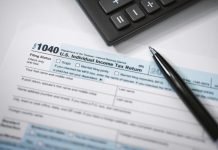

Many Americans this week may be asking themselves: Why should I care about the debt ceiling, or the — barring Congressional action — coming default? You’ve heard about it in the news but, much like the sequester or the shutdown, you’re not quite sure how it’ll affect your daily life.
Put simply, unlike corporate tax cuts, a debt ceiling default will have a trickle-down effect that will affect your wallet in one way or another.
The debt ceiling is a limit, set by Congress, for how much the U.S. Treasury is allowed to borrow to pay our country’s bills — which are racked up by Congress. In your household, if you want to buy something for which you don’t have the money on hand, you might ask a bank to loan you the money or use a credit card and pay the debt off later. Banks and credit card companies decide how much credit to extend to their customers — but, on the global market, countries, banks and individual and institutional investors decide how much money to lend a country by buying bonds.
One of the current stalemates in Congress is whether to allow the government to borrow more to pay the bills for which Congress already spent the money. And while you can stick a microphone in front of any one of a number of conservative Republicans — from Rep. Steve King (R-IA) to Rep. Ted Yoho (R-FL) to Rep. Dave Schweikert (R-AZ) to Rep. Mo Brooks — and have them reassure Americans (some of whom are already missing paychecks or veterans benefits because of the shutdown) that the debt ceiling default will have no effect, the truth of the matter is that economists all know this is a bad thing for the country and for regular Americans.
So while you might only be inconvenienced by the government shutdown, the debt default could have a serious impact on your personal bottom line, just in time for the holidays. Obviously, any account on which you pay or earn interest — from credit cards to student loans to savings accounts — could be affected, as could any account tied to the market, like a 401(k) or IRA. What should you expect — and what will cause the biggest hit to your budget?
1. Credit card interest rates to go up
One impact of a national default is that interest rates would rise — which means that anyone with a variable APR credit card could see increases in their interest rates, both on existing balances and new purchases. Even those people with fixed rate cards could see interest rate increases, as long as they are given 45 days notice. How much consumer interest rates go up — and when they stop — will be in the cold hands of the market.
2. Adjustable rate mortgages could go up
Even if you’re not trying to take out a new line of credit when interest rates go up, you could see your mortgage payments increase if you have an adjustable rate mortgage (ARM) and you’re within the allotted adjustment period. How much your interest rate could increase might be limited by the terms of your mortgage — or it might be up to your lender’s discretion. But, as many homeowners found out in the pre-bubble years, a rise in interest rates coupled with less money coming in might be the difference between an affordable mortgage payment and foreclosure.
3. Any government payment could be at risk of failing to arrive
While Social Security checks haven’t been affected by the government shutdown, that might not last. The government expects to run out of money and borrowing authority by Thursday, at which point they’ll have some decisions to make about which bills to keep paying. Checks for Social Security, unemployment benefits and tax refunds scheduled to go out as soon as this Friday could be delayed up to four days according to the Washington Post, and food stamp and defense contractor payments scheduled for October 25 could be delayed until October 30. And that’s all before $60 billion in military pay, veterans benefits and Social Security come due on November 1 — when, without a higher debt ceiling — the government will be reliant on the timing of tax receipts (which only cover 70 percent of its expenditures anyway).
Originally published on The Huffington Post









